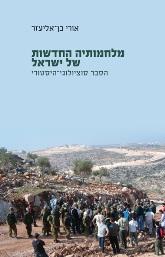Israel’s New Wars: A Historical-Sociological Explanation
Why do you consider the Al-Aqsa Intifada a new war?
“It had many of the characteristics of a new war: an asymmetrical war between a state and a ‘non-state,’ which had no decisive battles or conquering of territory, and both sides used guerrilla warfare tactics. The enemy was not always defined either. Was it the Palestinian Authority, Hamas, all Israelis, only the settlers?
“Concepts such as victory or defeat lost their meaning. There was a battle for awareness. And motives like revenge played a primary role in the battle, even overshadowing rational goals. Many civilians on both sides were harmed, and an end was never declared.”
Does the global war on terror influence Israel’s new wars?
“The attacks of September 11, which took place at the height of the Intifada, were seen in Israel as an opportunity to show the whole world how badly Israel suffered from terrorism. But the Americans weren't entirely convinced of the similarity between the two cases and President [of the United States at the time, George W.]Bush even decided not to include Israel in the coalition for the global war on terror. Since then, Israel has tried to show them that they were mistaken.
“The seizure of the arms vessel Karine A [by the IDF in 2002] enabled Israel to prove to the Americans that the weapons on board had come from Iran. After that incident, the Americans stopped seeing [then Palestinian leader Yasser] Arafat [who Israel said was to receive the weapons] as a partner in peace. But since then, Israel has used the rhetoric of global terrorism to undermine the Palestinians’ demand for national independence and to justify remaining in the territories.”
Do you see the withdrawal from Gaza and the construction of the separation barrier as part of the new war or as a means to end it?
“Both of those projects were useful in the short term as far as minimizing the friction between Israel and the Palestinians. But at the basis of both of them were security-related and diplomatic motives – keeping the Americans quiet – and they demonstrated no desire for peace on Israel’s part.
“Otherwise, Israel would have withdrawn from Gaza by agreement with the Palestinians and built the separation barrier along the Green Line without annexing territory. Such an act creates anger and bitterness among the Palestinians and will lead to the next outbreak of war.”
Would the doctrine of combat that is used against Palestinians in the territories have been effective during the Second Lebanon War, which was also a new war?
“The Israel Defense Forces’ inability to defeat several hundred Hezbollah fighters is now almost certainly being studied as part of military organizations’ curricula – and not only in Gaza. The Second Lebanon War also had the characteristics of a new war: it was a technological war that was based on instrumental rationales and the former [Israeli] Air Force commander’s belief that it could be won from the air.
“It was also a new war of the second type, between a state and an army and a ‘non-state’ and guerrilla fighters. The boundary between the front and the rear was blurred both in Israel and in Lebanon, and it was difficult to define victory. Israel had a much more difficult time in Lebanon because Hezbollah was better trained and had more advanced technology than the Palestinians, and also because Israel’s feeling of superiority proved groundless once again, particularly when it comes to wars that can be avoided.
“This kind of feeling is problematic and dangerous since Israel went to war because of it, as the investigative committee [the Winograd Commission] noted, without preparation or planning and with impassioned statements that had nothing behind them.”
By Vered Lee

